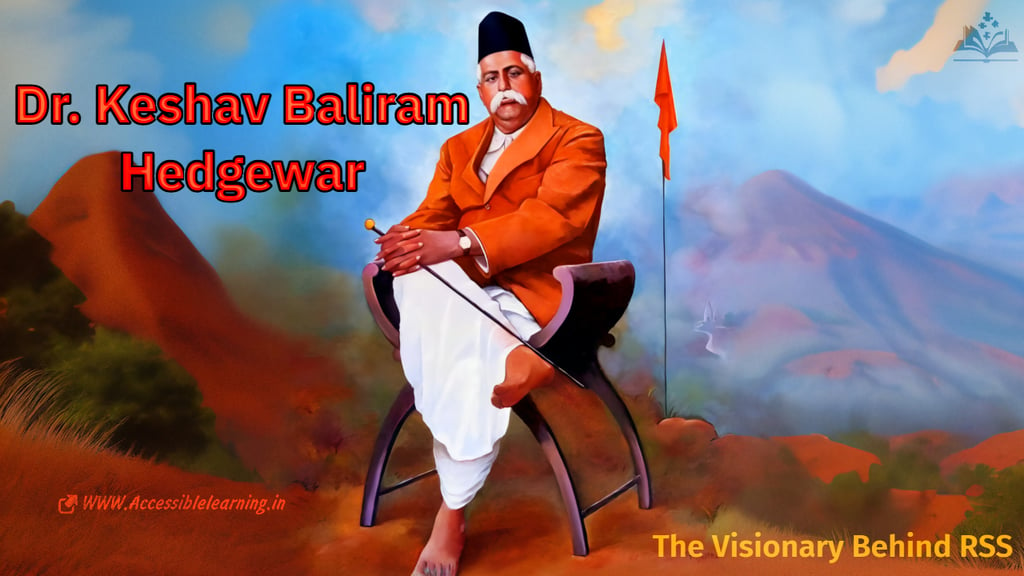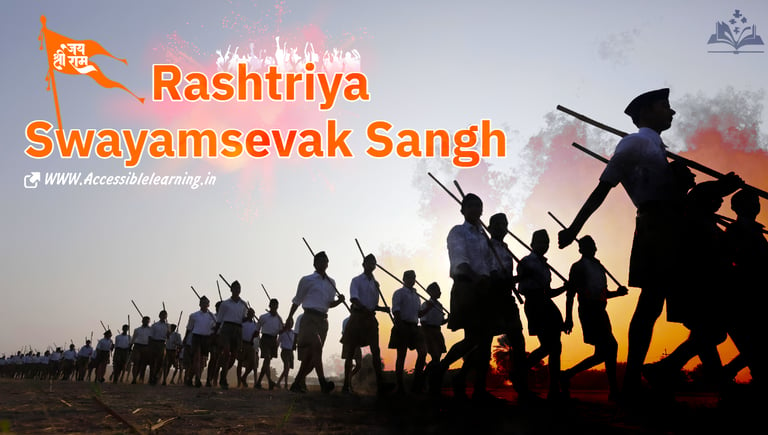
Dr. Keshav Hedgewar: A Leader of Vision, Unity, and Cultural Revival
The inspiring life of Dr. Keshav Baliram Hedgewar, the visionary founder of the Rashtriya Swayamsevak Sangh (RSS). Learn about his early life, revolutionary influences, philosophy of Hindutva, and his lasting impact on India's cultural and national unity.
RSSBIOGRAPHY/HISTORYEDUCATION/KNOWLEDGEINDIA/BHARATBIOGRAPHY
Sachin K Chaurasiya
1/28/20254 min read


Dr. Keshav Baliram Hedgewar Ji (डॉ. केशव बलिराम हेडगेवार), the founder of the Rashtriya Swayamsevak Sangh (RSS), was a visionary who sought to awaken India's collective consciousness through discipline, self-reliance, and cultural pride. His life, marked by determination and service, continues to inspire millions in India and across the globe.
Early Life and Formative Years
Born on April 1, 1889, in Nagpur, Maharashtra, Keshav Hedgewar (केशव हेडगेवार) hailed from a modest Brahmin family. His parents, Baliram Pant and Revatibai, were devout Hindus who instilled in him values of simplicity and dharma. Tragedy struck early in his life when he lost his parents during a famine, leaving him to navigate life's hardships from a young age. Despite these challenges, Hedgewar's resilience shone through as he excelled in academics.
From an early age, Keshav exhibited a strong sense of patriotism. He was deeply disturbed by the oppressive British rule and its detrimental impact on India's social fabric. His rebellious streak was evident when, as a young student, he publicly expressed his disdain for British dominance by singing nationalist songs, earning reprimands from his teachers.
Revolutionary Influences in Calcutta
Hedgewar’s education at Calcutta Medical College was a transformative period. While pursuing his medical degree, he came into contact with revolutionary groups like the Anushilan Samiti, a secret organization working toward India's independence. He imbibed their revolutionary zeal and learned the importance of organized efforts to achieve long-term goals. Hedgewar realized that addressing India's challenges required more than armed rebellion—it required a cohesive and awakened society.
In Calcutta, Hedgewar also delved into the teachings of nationalist leaders such as Swami Vivekananda, Sri Aurobindo, and Bal Gangadhar Tilak. Their emphasis on cultural pride and spiritual strength deeply influenced his philosophy. His return to Nagpur after completing his medical studies marked the beginning of his active involvement in nationalist activities.
Political Activism and Disillusionment
Dr. Hedgewar became a prominent figure in Nagpur’s nationalist circles. He actively participated in the Non-Cooperation Movement led by Mahatma Gandhi in 1920. However, his optimism was short-lived when Gandhi abruptly called off the movement following the Chauri Chaura incident in 1922. This decision deeply disillusioned Hedgewar, as he felt that the lack of sustained organization among the masses was hindering India's freedom struggle.
This pivotal moment led Hedgewar to pivot from political agitation to social reform. He believed that India's liberation could only be achieved by first addressing the deep-seated social divisions and fostering unity across communities.
Founding of the Rashtriya Swayamsevak Sangh (RSS)
Recognizing the need for a unifying force, Dr. Hedgewar founded the Rashtriya Swayamsevak Sangh (RSS) on Vijayadashami, 1925, in Nagpur. His vision was to create an organization that would instill discipline, character, and a sense of duty among Indians.
The RSS began modestly, with only a handful of participants, but its appeal grew steadily. Hedgewar focused on organizing daily shakhas (branches) where individuals engaged in physical training, intellectual discussions, and community service. The shakhas were designed to break barriers of caste, region, and language, fostering a sense of collective identity rooted in India's cultural heritage.
Philosophy of Hindutva
Dr. Hedgewar's ideology was deeply influenced by the concept of Hindutva, as articulated by Veer Savarkar. However, for Hedgewar, Hindutva was not limited to religious identity; it was a comprehensive way of life that celebrated India's civilizational values. He emphasized that the term "Hindu" represented a cultural identity encompassing all who considered India their motherland and revered its traditions.
Challenges and Growth
In its early years, the RSS faced numerous challenges, including skepticism from political leaders and suppression by the British colonial government. Despite this, Hedgewar's charismatic leadership and unwavering commitment kept the organization resilient. By the 1930s, the RSS had established branches across several states, attracting individuals from diverse walks of life.
Dr. Hedgewar's Leadership Style
Dr. Hedgewar was a leader who believed in leading by example. He maintained a simple lifestyle, shunning material comforts. He often traveled extensively, connecting with volunteers and motivating them through his speeches. His humility and accessibility endeared him to RSS swayamsevaks (volunteers), many of whom went on to become influential figures in independent India.
Impact on India’s Freedom Movement
While the RSS officially maintained a non-political stance under Hedgewar's leadership, it indirectly contributed to the freedom movement by fostering a sense of nationalism and self-reliance among its members. Hedgewar himself participated in protests against colonial policies, and many RSS volunteers actively supported the Quit India Movement in 1942.
Lasting Legacy
Dr. Hedgewar Ji passed away on June 21, 1940, after battling poor health. Although he did not live to see India achieve independence, his vision for a culturally united and self-reliant nation laid the groundwork for the post-independence era.
Under the leadership of his successor, M. S. Golwalkar, the RSS grew into a nationwide organization with a far-reaching impact. Today, the RSS boasts millions of members and is considered one of the largest voluntary organizations in the world. Its affiliated groups, collectively known as the Sangh Parivar, work in diverse fields such as education, healthcare, disaster relief, and rural development.
Dr. Hedgewar’s Influence on Modern India
Dr. Hedgewar Ji's emphasis on cultural nationalism has profoundly shaped modern India’s socio-political landscape. Many prominent leaders, including former Prime Ministers Atal Bihari Vajpayee and Narendra Modi, were influenced by the RSS's ideals. The organization's focus on selfless service, character-building, and grassroots development remains central to its mission.
Dr. Keshav Baliram Hedgewar Ji was more than a freedom fighter; he was a nation-builder who dedicated his life to uniting India’s fragmented society. His foresight in establishing the RSS as a platform for collective empowerment continues to resonate in contemporary India.
His life serves as a reminder that true leadership lies in inspiring others to rise above individual interests and work toward the greater good. Dr. Hedgewar's legacy is a testament to the enduring power of vision, discipline, and unwavering commitment to one's ideals.
Subscribe To Our Newsletter
All © Copyright reserved by Accessible-Learning Hub
| Terms & Conditions
Knowledge is power. Learn with Us. 📚




